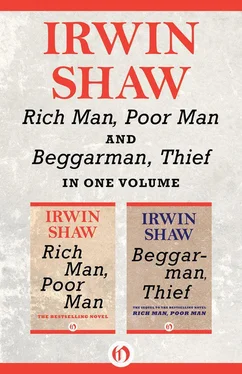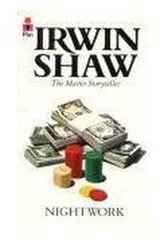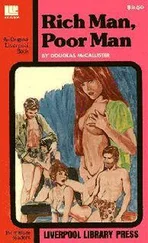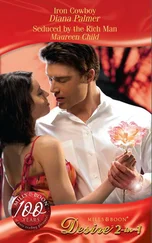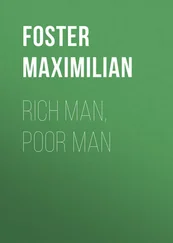“Of course,” Donnelly said. He stared sternly at Billy.
Billy tried to smile, then kissed Gretchen’s cheek. “Thanks, Mother,” he said, “for a marvelous day.”
Gretchen gripped his arm, briefly, then broke into a sob. “Forgive me,” she said. “It’s just that it’s—well—it’s all too much for me. I’ll be all right in the morning.” Wesley opened the door and was about to go out when Gretchen called to him. “Wesley, you’re not going to disappear again, are you?”
“No, ma’am,” Wesley said. “I’m just two floors down if you need me.” Rudolph had tried to put him in the same room with Billy, but Billy had said he was afraid of sleeping in the bed next to Wesley’s, there was no telling what that crazy boy might do, even on a night like this. He hadn’t told Rudolph what he really was afraid of and with any luck Rudolph would never find out.
As the door closed behind the four men and they went down the corridor, Rudolph said, “I’m not sleepy. I have a bottle of champagne in my room, too. Would you like to help me with it?”
“I have some people to see about tomorrow,” Simpson said, “but you boys drink hearty.” He stood against the back of the elevator wall, gaunt and mournful, doomed to praise other people and never himself all his life, as he raised an eloquent hand in a parting salute to the uncle and two nephews who were going to continue the evening’s celebration with a bottle of champagne while he prepared the morning.
As Rudolph wrestled with the cork of the champagne bottle, he noticed Wesley eyeing the locked bag on the chair near the window. “I bet,” Wesley said, as the cork popped and Rudolph began to pour, “I bet it’s right in there.”
“What’s right in there?” Rudolph said.
“You know what I’m talking about,” Wesley said.
“Drink your champagne.” Rudolph raised his glass.
Wesley put his glass down deliberately and reached into the pocket of the borrowed dinner jacket and brought out a small pistol. “I don’t need it anymore,” he said evenly. “Keep it as a souvenir.”
“Crazy as ever,” Billy said.
“I’ll drink to that,” Wesley said.
They drank.
Wesley put the pistol back in his pocket.
“So,” Rudolph said, “you were sitting there in the hall watching yourself act and taking bows with that thing on you all night.”
“Yep,” Wesley said. “You never know when a target might show up.”
Rudolph paced around the room, frowning. “Wesley,” he said, “what if I told you that the matter will be taken care of without your having to do anything about it?”
“What does that mean? Taken care of?”
“It means that right now, as we drink champagne in this room, a professional killer is looking for your man.”
“I’d say I don’t want anybody to do the job for me,” Wesley said coldly, “and I don’t want any more gifts from you or anyone else.”
“I intend to stay here in Cannes until the end of the festival,” Rudolph said. “That’s only ten days. If the job isn’t done by then, I’m going home and calling it quits. All I want from you is a promise that you won’t do anything until then. After that, you’re on your own.”
“I’m not promising anything,” Wesley said.
“Wesley …” Billy said.
Wesley turned on him sharply. “You keep out of this. You’ve meddled enough already.”
“Calm down,” Rudolph said. “Both of you. Another thing, Wesley. Your friend Miss Larkin called the other day. You owe her a lot, too.”
“More than you know,” Wesley said. “What did she have to say?”
“She wants to come over here. She thinks she can get leave from the magazine for two weeks. She’s waiting for a call from you.”
Wesley finished his glass of wine. “Let her wait,” he said.
“She said you knew she might come over. That you wanted her to come.”
“I thought the whole thing would be over by now,” Wesley said. “Well, it isn’t over. I’ll see her some other time.”
“Ah, the hell with it,” Rudolph said. “I’m not going to play Cupid with all the other things I’m doing. Let’s finish the bottle. I’m going to get some sleep.”
“What’re you going to do now?” Billy asked Wesley when they were alone in front of the hotel.
“Night patrol,” Wesley said. “Want to come along?”
“No.”
Wesley looked quizzically at Billy. “What do you think of all this?” he asked.
“I’m scared shitless,” Billy said. “For all of us.”
Wesley nodded solemnly.
“I’ll walk with you as far as the parking lot,” Billy said. “I forgot to put the top up on the car and it looks as though it might rain.”
Wesley helped as they put the top up and Billy rolled up the windows. “Wesley,” Billy said, “it still would be a nice idea if we two drove up to Paris, with a few stops for tennis and feasts along the way. You could ask your girl to meet you there. They’ll drive you bats down here in the next ten days. How much harm can another ten days do after all this time?”
“I’ll play tennis all right with you, Billy,” Wesley said. “Down here. Good night, pal.”
Billy watched the tall figure in the dark suit with the little bulge in the pocket stride off. He shook his head and walked back to the hotel. In his room he double-locked the door.
The next morning he awoke early and sent down for the newspapers. Along with the special sheets put out for the festival, the bellboy brought a copy of Nice-Matin. On the front page there was a photograph of a man who looked familiar. The man was wearing dark glasses in the photograph and he was between two policemen. It was Monika’s frozen-food friend from Diisseldorf. In the accompanying story, Billy read that he had been arrested on an anonymous tip over the telephone and that he had been caught with a bomb in his possession hidden in a motion picture camera case. The man who had phoned in the tip, the article continued, had spoken in a pronounced Midi accent.
Billy smiled as he read that. Wesley, he thought, was not the only actor in the family.
« »
They played tennis the next morning, driving over to a quiet club in Juan-les-Pins in the little open car, Wesley, in blue jeans and faded cotton shirt and a tweed jacket with frayed cuffs, not looking so much like an actor who had been acclaimed in the press as a man with an exciting career ahead of him. Billy had touched the little bulge in the pocket with distaste and had said, “Can’t you leave that damn thing at home even when you play tennis? It gives me the willies. I have the feeling you’ll take it out and shoot me if I ace you once too often.”
Wesley smiled benignly. “Where I go, it goes,” he said. And when they went out to the court he wore the jacket over his tennis clothes and before they started to play laid it carefully over a bench near the net, where he could see it at all times.
The first day Wesley played with the same old wild abandon, hitting the ball savagely, more often than not into the net or to the backstop. After two hours of that Billy said, “That’s enough for today. If you acted like that they wouldn’t let you as much as see a movie even if you paid for the ticket.”
Wesley grinned. “Youthful high spirits,” he said, putting on the tweed coat over his soaked shirt. “I promise to reform.”
“Starting when?”
“Starting tomorrow,” Wesley promised.
When they went in to take their showers, although there was nobody else in the locker room, Wesley insisted that Billy stay in the room and watch his jacket while he took the first shower.
“I’ve done some foolish things in my time,” Billy complained, “but this is the first time I’ve hired out as a coat watcher.” He sat down on the bench in front of the lockers as Wesley stripped, the big muscles of his back standing out clearly, the long legs heavy, but perfectly proportioned. “If I had a build like yours,” Billy said, “I’d be in the finals at Wimbledon.”
Читать дальше
